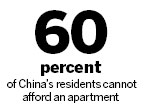Society
Majority of population still cannot afford home
By Chen Jia (China Daily)
Updated: 2011-05-06 07:58
 |
Large Medium Small |
BEIJING - More than 60 percent of China's residents cannot afford an apartment and the high property prices in the cities are curbing the nation's urbanization process, experts said.
|
 |
"Migrant workers are unable to afford apartments in the cities, which forces them to return to their hometowns and build houses in rural areas," said Li Enping, associate professor at the Institute for Urban and Environmental Studies under the Chinese Academy of Social Sciences, on Thursday.
Li was speaking at the launch of the Blue Book of Real Estate, an annual report on the development of China's real estate market. It is the eighth year that the Social Sciences Academic Press under the Chinese Academy of Social Sciences has published the report.
Such speculative investment is one reason that has caused urban house prices to rocket.
As part of its 12th Five-Year Plan (2011-2015), the central government pledged earlier this year to build 10 million units of government-subsidized housing in 2011 and 36 million units in total by 2015 in an attempt to cool the over-heated real estate market.
The country will need to spend about 1.3 trillion yuan ($197 billion) to build the 10 million units of government-subsidized housing this year. To fund the work, the central and local governments will together provide more than 500 billion yuan, with the remainder channeled from social institutions and individuals, according to figures from the Ministry of Housing and Urban-Rural Development.
However, the government is under great pressure to find the money needed to support such a large-scale construction program.
"The money should come from the government, banks and various social institutes," said Wang Yulin, vice-director of the policy research center under the Ministry of Housing and Urban-Rural Development at the launch.
"The State-owned enterprises under the administration of the central government should take the lead and further increase their investment in building subsidized-housing projects," Wang added.
Li Yang, vice-president of the Chinese Academy of Social Sciences, said on Thursday that Chinese people should consider renting rather than buying.
"In China, only about 10 percent of people rent. That it is much lower than the 38 percent in the United States and the 70 percent in Germany," he said.
| 分享按鈕 |




